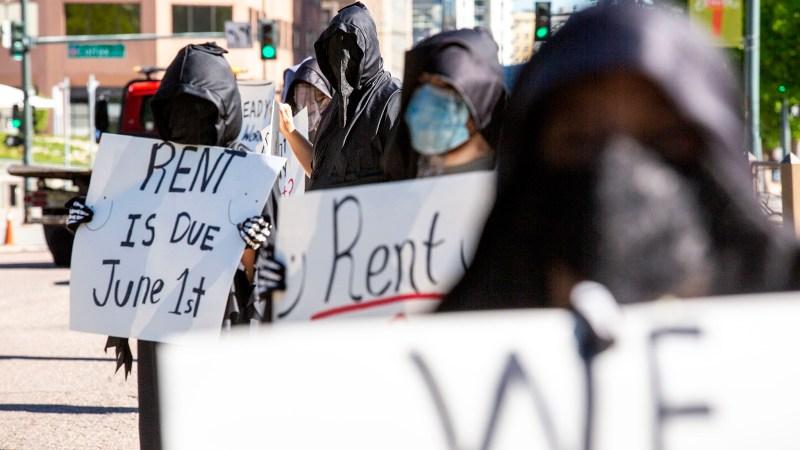
Editor's note: The national eviction moratorium expired on July 31. Our original story continues below, and here's the latest on evictions in Denver.
It looks increasingly likely that the national moratorium on evictions will expire next month. The federal Centers for Disease Control announced this week that it had extended the policy until July 31, but that it didn’t intend to add any more time after that.
In Colorado, that means that the regular evictions process may resume for the first time since the beginning of the pandemic — but that depends on Gov. Jared Polis.
Here’s what you need to know.
What happens when the moratorium expires?
Right now, the moratorium says that landlords can’t evict tenants in certain situations. It applies only for people who made less than $99,000 in 2020 or 2021, or $198,000 as a couple. And it’s only meant for cases where someone faces homelessness because they lost income during the pandemic or face extraordinary medical expenses.
When the moratorium goes away, landlords can start the eviction process against practically any tenant who owes back rent.
How fast will evictions happen?
The end of the moratorium won’t mean that people are instantly removed from housing. But it does start a countdown.
Landlords begin the eviction process by posting a demand for repayment. Currently, renters are allowed 30 days after that to pay what they owe. When that 30 days expires, the landlord can take the case to court. Once the court case begins, landlords are under no obligation to accept repayment of the rent. In other words, renters don’t have any bulletproof options to stop an eviction once it goes to court.
In general, it can take three months from eviction notice to removal, said Drew Hamrick, general counsel for the Colorado Apartment Association. But the damage is done more quickly: Losing an eviction case can result in a permanent mark on a person’s record.
The speed of evictions after the moratorium will also depend on how fast local courts take up the cases and local law enforcement carries out removals.
Additionally, some of the rules around eviction are set to change.
The current 30-day notice is actually longer than normal in Colorado. Gov. Polis ordered the longer repayment period during the pandemic, but that order expires at the end of June. If the governor doesn’t extend it, the repayment window will shrink back to 10 days.
On the other hand, Colorado tenants may soon get permanent new protections under Senate Bill 273, which the governor plans to sign Friday. When it takes effect in October, the new law will allow renters to repay their debts and avoid evictions throughout the court process, giving them weeks of extra time.
The current protection prevents landlords from evicting anyone who has a pending application for rental assistance, but has not yet received the money. In many cases, tenants and landlords have been approved for rental assistance but have waited months to actually receive funding from the government. During those 30 days, the tenant can repay their rent to avoid the eviction case.
Want to share your experience with evictions or housing assistance? Contact the reporter.
What can renters and landlords do?
The only guaranteed way to stop an eviction for nonpayment is to repay the debt. Housing advocates and attorneys are urging landlords and renters to work together to ensure that renters have enough time to pay off their back rent.
The state has published a template for a repayment agreement. The idea is that landlords will agree — in writing — not to evict tenants as long as the tenants stick to their repayment schedule.
Is housing aid still available for renters and landlords?
Yes. People facing eviction are eligible for financial help from the federal government.
That money’s being distributed through the Colorado Emergency Rental Assistance Program for people who make less than 80% of the “area median income” where they live. (Check here.) ERAP can give people money for the rent they already owe, plus two upcoming months.
If you need more guidance, contact the state-sponsored Housing Counseling Assistance Program at 844-926-6632 or at ColoradoHousingConnects.org.
In some cases, you’ll need to apply to a local service provider (instead of the state government) to get the money, but the state ERAP website and the Colorado Housing Connects website can point you in the right direction.









